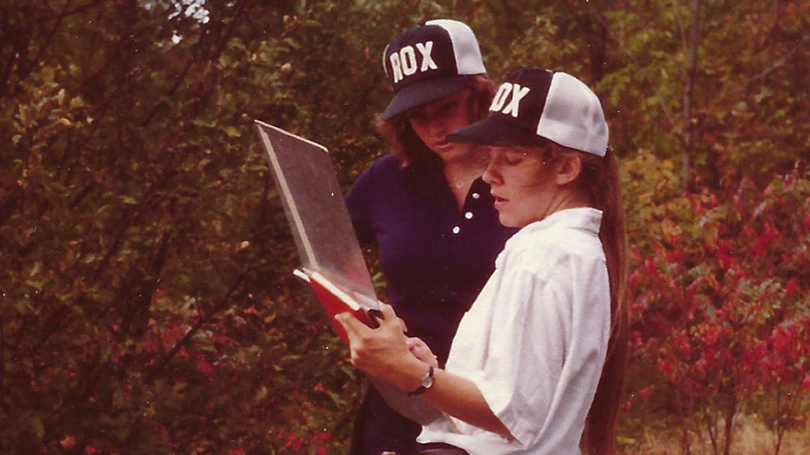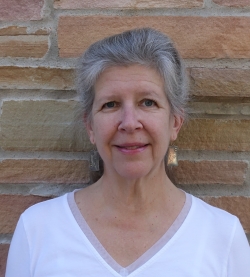


"You have to be comfortable with change," says Edith Newton Wilson '82, CEO of Rock Whisperer LLC, a Tulsa-based consulting firm focused on renewable energy and climate risk mitigation projects, when asked what kind of advice she might give someone considering a career in energy. In terms of her life and career, change is something that she has not just felt comfortable with, but actively pursued. "I've always been bitten by the 'new venture, new opportunities, new frontier bug,'" she says.
New frontiers were on her mind from a young age. As a student in her small high school in Macon, Georgia, the "glory of New England" and the power of an Ivy League education were never far from her thoughts. "My mother had gone to school at Radcliffe and the Harvard Graduate School of Design, and I had grown up inspired by her," she explains, so New England was definitely on the itinerary when it came time to think about college. Wilson and her mother toured some Boston colleges, and then headed up to Hanover on the advice of a friend enrolled at Dartmouth. "That was it for me," she remembers. "I applied early decision and never looked back!"
Wilson reveled in the new opportunities of northern New England and Dartmouth. "I was eager for broadened horizons," she explains, and the wealth of new experiences at Dartmouth set the course for her future. Not only did she discover a love for the outdoors and connect with people who would become lifelong friends, she also found a new academic direction. While she had arrived intending to be a math major, and was exploring biology as another possible direction, it wasn't until a conversation with a chemistry professor that her academic —and ultimately career — path "clicked."
"I remember sitting in the freshman chemistry lab in Steele Hall," says Wilson, "and talking with the professor about what I was enjoying about chemistry and what I was finding frustrating, and he said, 'You need to go take a class next door in the Earth Sciences Department. I think you'll really like it.' And he was right, I did!"
After graduating from Dartmouth, Wilson spent a year and half at Anaconda, a Montana mining company where she had worked during her junior summer, and then went on to get her PhD at Johns Hopkins. While she had initially planned to pursue a teaching and research career, when her husband was offered a job with Shell's research division in 1987, the couple decided to move to Houston, Texas. It was in Texas, says Wilson, that "I rapidly realized how much fun science they were doing at that point in the petroleum world… and so that's what landed me in the career that I pursued for the next 25 years in oil and gas exploration."
While energy tends to be a male-dominated industry, Wilson notes that her entry into the field was made easier by the women who came before her and from a range of supportive mentors and colleagues. Even at Dartmouth (which had only been co-educational for five years before Wilson enrolled), she says, "I was not the first generation of women to break in. . . About a third of the geology students on my Stretch were women." And, while definitely not typical, one of the mining crews she worked on at Anaconda was all women. "I have just really been fortunate to have women supervisors, graduate student advisors, and colleagues…"
After 13 years in Texas, Wilson and her family decided to relocate to Tulsa, Oklahoma, where they live today. "Tulsa is a progressive community with access to wonderful culture and which lets us manage life more simply" than in a big city like Houston. She spent a few years in Tulsa working with ConocoPhillips, moved on to serving as the senior geological advisor and technical manager of geology at Samson Resources, then set off on her own, co-founding and building TallGrass Energy, a small, privately held oil and gas operating company.
Wilson eventually sold TallGrass in 2011 and "sort of intended to retire and do some teaching and pro-bono work." But her consulting firm, Rock Whisperer, that she had founded primarily as a holding company, "got really busy and I started doing a lot of work in the kind of geology I had trained in — carbonate geology."
Business picked up at what she describes as a "technical and emotional crossing," however. "This was just about the time that the renewable and fossil fuel curves began crossing from a cost perspective. And there was also a real divide developing between what motivated me in the energy business – to provide affordable, reliable, sustainable energy for everybody – and the way my industry was behaving in terms of its climate change denial… failure to regulate induced earthquake swarms in Oklahoma…really a general reluctance to own up to its responsibility for the negative impacts of oil and gas production." She wanted to work on the problems of the future, rather than clinging to the past.
And so, Wilson says with a smile, "I fired all my fossil fuel clients and said, 'I'm a renewable energy geologist' … and then set out to figure out what that meant!"
Wilson realized that the experiences and perspectives that she had gained — starting with her Dartmouth education — gave her a powerful and unique toolkit to bring into the renewable energy space. After really digging into the technical side of renewable technology, she says, in addition to expertise in subsurface geoscience, "I began to realize what I brought with me was a really good understanding of project management and a capability to interact with people individually and on the small-team level."
Currently Wilson focuses on three areas in her work: consulting with tech start-ups and other businesses focused on renewable energy; connecting emerging professionals to opportunities to work on global energy solutions; and doing mapping and climate mitigation advocacy for at-risk communities. "I spend a lot of time just connecting resources and opportunities with people. One of the most important things I've learned in my four decades in business is that every person you meet is a valuable connection. You never know where those intersection points are going to lead."
When asked what excites her most about the future of energy, Wilson doesn't hesitate to reply: equity. "Because it is so much cheaper, because the business model is so much less capital intensive than oil and gas… the renewable energy revolution can provide affordable, sustainable, reliable energy for the 1.7 billion people on the planet who lack reliable access to energy." As she continues to engage with businesses, communities, emerging professionals, and students, equity forms the center of her work and is a driving force behind her efforts to contribute to the energy transition.
_________________________
Edith Newton Wilson '82 gave an online talk called "Critical Minerals: Powering the New Energy Economy," on Tuesday, April 5, 2022 as part of the Dartmouth Energy Collaborative's spring series on minerals, materials, and energy. View a recording of her talk.